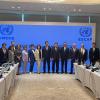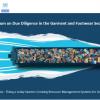News
Displaying Results 1 - 25 of 46
Addressing the Tashkent International Investment Forum (2-3 May 2024), UNECE Executive Secretary Tatiana Molcean called for the mobilization of private sector investments to support the implementation of the Sustainable Development Goals (SDGs) and to foster regional cooperation in Central Asia.…
In today’s world of resource scarcity and the triple planetary crises of climate change, nature loss and pollution, many efforts are focused on developing new technologies, tools, products, and services that foster circular and sustainable consumption and production patterns across the textile,…
Increasing the use of digital solutions including those developed by the United Nations Centre for Trade Facilitation and Electronic Business (UN/CEFACT) can enhance the sustainability and resilience of supply chains and strengthen global connectivity.
In a series of capacity-building activities…
The global market for second-hand clothing has been multiplied by seven in the last 4 decades. The practice of exporting second-hand clothing from developed to developing countries has been intensified by the boost of the fast fashion industry, impacting the environment, social and human rights in…
Four years ago, when the COVID-19 pandemic hit, it disrupted the normal functioning of open markets. The ensuing crisis had crippling effects on global trade and productive capacities: it broke supply chains, reduced connectivity and slowed the flow of essential goods. Global food and energy…
In recent years, Montenegro and its capital city, Podgorica, have been committed to accelerate sustainable and smart urban development through a variety of ambitious national and regional and local measures, such as digitalization of public services, modernization of public transport, and to…
According to a recently published UNECE Policy Paper, the agrifood, the garment and footwear and the mineral sectors contribute significantly to the economic growth and employment in the UNECE region, while being major sources of global greenhouse gases (GHG) and environmental pollution. Evidence…
Transparency in the environmental performance of economic activities and effective public access to environmental information, especially on products, are indispensable in addressing pressing environmental challenges. This also supports a just transition towards a green and circular economy,…
UNECE support for the revision of the Georgian Mining Code Act is shaping the future of resource classification and estimation standards in Georgia. During a workshop in Tbilisi participants discussed how Georgian standards could play a crucial role in harmonizing with the global dimensions of the…
Clothing production has doubled in the past 15 years. In 2018, the fashion industry produced around 2.1 billion tons of greenhouse gas emissions (GHG) – 4% of the world’s total – leading to major environmental, health and social challenges. In 2020 in Europe, textile consumption had the third…
The Norwegian Government has issued a Mineral Strategy which necessitates the Geological Survey of Norway to produce an inventory aligned with the United Nations Framework Classification for Resources (UNFC).
UNFC will be crucial in this strategy as it will be used to classify mineral resources…
Since September 2022, as part of “The Sustainability Pledge” initiative, UNECE has been working with fashion company Stella McCartney and its Cotton supplier SÖKTAS to trace a T-shirt made of jersey fabric through documentary evidence.
The UNECE blockchain platform allows to capture all actors…
While underground coal mining in Albania stopped almost wholly (except for two private mines with a very insignificant output) more than 15 years ago, the abandonment of the mines from the 1990s onwards with no proper plans for closure has left a legacy of risks. These include water contamination,…
As the global economy emerges from the COVID-19 pandemic and governments strengthen efforts to “build-back-better”, trade as an engine of growth has re-emerged in policy agendas. For developing countries and countries with economies in transition that are still in the process of accession to the…
Momentum is growing on the digitalization of the Middle Corridor, linking the European Union and Asia, through Central Asia, the Caucasus, Türkiye and Eastern Europe, through the use of UNECE and UN/CEFACT standards for digitalization of multimodal data and document exchange.
Representatives of…
In 2021, Chile was the world’s fourth largest importer of second-hand and unsold clothes, and the first in Latin America. Imports reached some 126,000 million tons, originating principally from China, the United States and the Republic of Korea.
About 40% of these clothes are imported through…
In a move towards sustainable resource management, several countries have presented case studies of how the United Nations Framework Classification for Resources (UNFC) can scale-up harmonized resource management. UNFC provides a common language and standards for the classification of all energy…
While companies and stakeholders across industries will not tire to make promises that include their willingness to become more transparent, we still see little actual progress. Research by Deloitte has shown that 65% of procurement leaders across sectors have limited or no visibility beyond their…
“It's now or never, if we want to limit global warming to 1.5°C”, stated the IPCC authors earlier this year. “Without immediate and deep emissions reductions across all sectors, it will be impossible”, they continued.
With worsening climate effects all over the world, all eyes turned to COP27…
The transition from linear to circular economies requires fundamental rethinking of trade policies and regulations. “Harmonized System” codes (HS codes) are a key pillar of the tariff infrastructure for international trade. These HS codes were designed at a time when circular economy considerations…
The global economy must be urgently steered away from unsustainable production and consumption patterns, which fuel the climate crisis, deplete natural resources and negatively impact both people and the environment. Global value chains are predominantly linear in nature, and the lack of…
Circular economy transformation is a new area of cooperation between the United Nations Economic Commission for Europe (UNECE) and the Government of Tajikistan. Under the overarching leadership of the Ministry of Economic Development and Trade, UNECE together with the UN Tajikistan, and in…
The United Nations Framework Classification for Resources (UNFC) is now published in Greek and Portuguese. These translations will support policymakers to implement enhanced sustainable resource management in the UNECE region.
A universally acceptable and internationally applicable scheme for the…
In 2022, international cooperation in energy and critical raw materials is high on the agenda. Optimal use of critical raw materials, for which demand is set to continue rising, will be crucial in delivering the green transition in energy, mobility and the digital world.
This will be in the…
July is a month to start enjoying the harvest of fruits and vegetables for many in Europe and the topic of reducing food loss and waste becomes very urgent. In Serbia, agriculture is an important sector of the economy, contributing around 6% of GDP. In March 2022 food production accounted for 10.4…

























